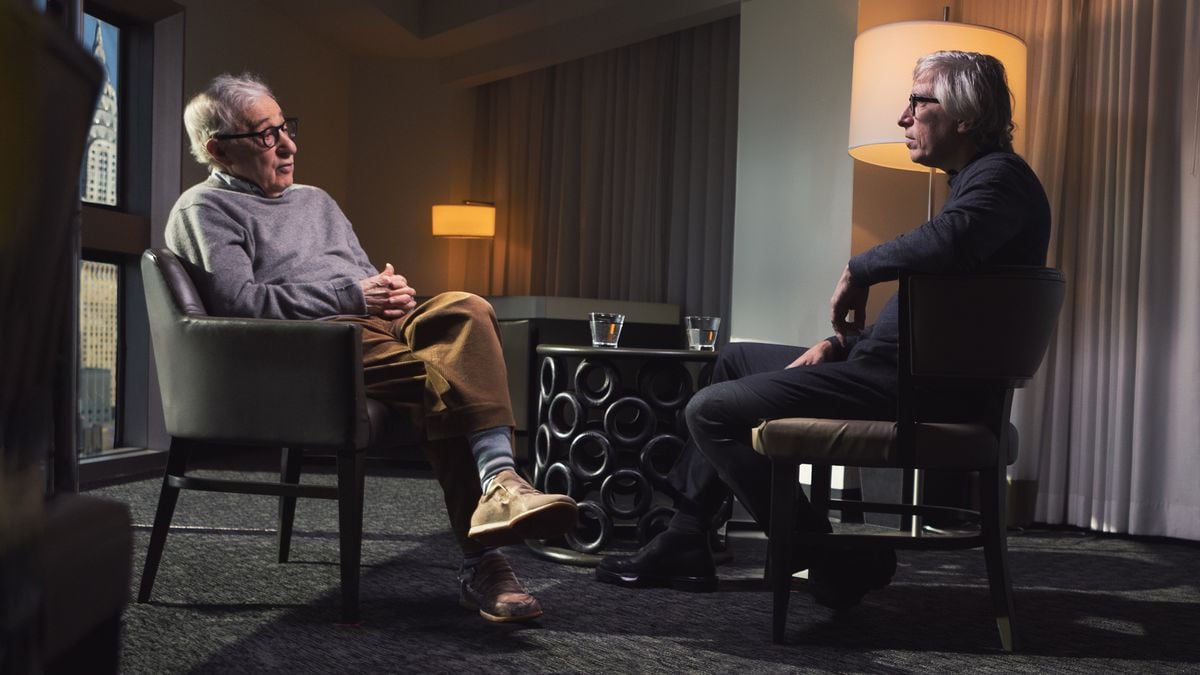In 1992 the double Woody Allen scandal broke out: it was discovered that he had started a relationship with Soon Yi, the adoptive daughter of his partner, Mia Farrow, and later she accused him of sexually abusing their adoptive daughter, Dylan.
Despite the time that has elapsed, we are still arguing about what happened.
What's more, in recent years the issue has taken on special virulence and relevance, revived by the #MeToo movement and the statements of an already adult Dylan.
In his book
The Woody Allen Syndrome.
Why Woody Allen has gone from being innocent to guilty in ten years
, Edu Galán reviews the case and tries to explain why it has become one of the hottest issues in cultural struggles today.
The result is the story of how a judicial and family drama from almost 30 years ago ends up portraying some of the most complex aspects of our current society.
From lynching in networks, the review of the past, personalism, sentimentality, victimhood or identity struggles.
We spoke with Edu Galán about these and other issues that his latest book touches on.
Although mentioning Woody Allen in networks is still a guarantee of controversy, has it really been
canceled
?
He continues to make films freely, he has published his memoirs, gives interviews, gives concerts, does promotion… he himself said in his memoirs that he continued to have absolute freedom and that what happened did not affect his daily life.
First of all, I hate the term "cancellation culture", it seems very American to me, a
neo-word
.
Obviously in the case of Woody Allen, it has hardly affected him, but as I explain in the book, it is a very juicy case that helps me to point out this way of censoring that is the culture of cancellation.
Woody Allen is a warning, even though he declares himself immune.
In terms of material, he continues to have his premieres, his book has been a success, but personally that he has been exonerated - he did not even get to be judged - and even so 30 years later he is enduring being called a pedophile ... shit!
In addition, just "pedophile" and "incestuous", knowing that in this society crimes do not depend on their criminal severity but on their social consideration ... He seems to be sweating it because he is an absolute sociopath, an egomaniac, a Martian, but it is a situation that can lead to suicide or very serious psychological problems.
A philosophy is installed in other creators who do not have their status or their fame –or JK Rowling's–, who this situation can destroy.
That is the problem, more than Woody Allen may or may not make films, which in my opinion are not of much interest either.
The book asks how Woody Allen has gone from innocent to guilty in ten years. I ask you the reverse question: why did the world forget about Dylan Farrow's sexual abuse allegations for almost 20 years?
There was a wonderful thing that was the right to be forgotten.
In a traumatic case of a separation of two irresponsible ones, I position myself morally saying that he is a psychopath and she is not well, although they also did something very fat to him.
But outside of that, custody was arranged in a court with all possible guarantees, so they have the right to be forgotten, to reintegration and for the case to be forgotten.
The drift of a feminism that is #MeToo was a cry from the women of Hollywood, and ended up having all the pros and cons of a cry.
She has warned us that there was a problem there, but we have to go much further.
That cry has been used by the Farrow family to revive a case in which I do not doubt that they feel victims or believe the version they proclaim, but what I defend is that this is irrelevant.
The writer Edu Galán, author of 'The Woody Allen syndrome.
Why Woody Allen has gone from innocent to guilty in ten years. '
JEOSM
However, the right to be forgotten is also wielded in much more complex situations, as in the case of Roman Polanski, with a judicial mess that has dragged on for decades. The rape victim herself, who was 13 at the time, says he is guilty but to be left alone. Is the right to be forgotten a weapon to wield only when the accused person is innocent or we believe so, or in cases such as Polanski or Bill Cosby, it is necessary to go back over the past and review situations that were not resolved at the time ?
What you are asking me is well regarded, that is why the title of the book is
Woody Allen syndrome
and not
Polanski syndrome
.
I appeal to the right to be forgotten for referring to Google, but in this case perhaps what I should have said is that, once something has been judged, you have the right to be forgotten, that this man has the right to continue his life.
This changes radically in cases like that of Polanski, who has been tried and has avoided the action of justice.
This is something else.
And then we enter the psychological, moral part, outside of justice, in which we can say that if the victim forgives him, society must forgive him, or not, but this would already be moral disquisitions.
I understand the argument of the one who defends: "if the victim forgives him and 50 years have passed, we will bury the issue now", but also the opposite argument that denounces that he is a man who avoided the action of justice (no matter how much the process can put him obstacles, as stated in the documentary
Roman Polanski: Wanted
).
The fact is that he fled and there I don't think the idea of the right to be forgotten fits;
you have to face the logical consequences of escaping.
And in the case of Polanski, that they make you ugly in an act or that you spend some time stuck in your house in Switzerland compared to spending twenty years in an American jail ... I think he came out winning.
The book also deals with the eternal debate about whether a work can be separated from its author. In the case of Woody Allen it is complicated because his cinematographic character is confused with the real one and is very based on himself. Then there is the case from the latest Polanski movie,
The Officer and the Spy
, about the Dreyfus case, in which an innocent man was wrongly accused and convicted, something that is very difficult not to interpret as self-defense.
In cases like this, how to separate author and work?
Regarding the first, I would tell you that I defend the opposite.
In Woody Allen, from what I have studied, his fictions are due more to a character, but accepting the opposite hypothesis, that it was part of his life, it does not matter because the moment you shoot it with a camera, it is fiction .
It has no material consequences.
In a movie, if you kill someone, they don't die.
As much as it was self-fiction, the idea of uniting author and work cannot be defended.
Fiction does not depend only on who writes it, it depends on the context, on the artistic form in which it is expressed ... to see Woody Allen's fictions as a reflection of his life is a mistake, because as Umberto Eco said, if you put yourself to search, you find it.
Another thing, as in Polanski, is what the author uses that work for.
In interviews he denies that it is an allegation about himself, but he would tell you that it is irrelevant.
What I am trying to make is understood is that this film has value outside of its author, in fact, that it has values that are far above those of its author.
The Guernika with its anti-fascist, pacifist value in favor of human rights, has more value than Picasso.
This is something that I ask the reader, to try to go further, to try to understand things instead of dispatching them as if the arm and the camera were the same.
He asks to understand and contextualize, and in the book he exposes the effects of living isolated in a bubble or of echo chambers, the inbreeding created by social networks in which you only end up reading what corroborates what you already think. Isn't the audience for this book also just those who think Woody Allen is innocent, when would it be a more stimulating read for those who think he's guilty?
Well, worse for some and worse for others.
If you read this book thinking that Woody Allen is legally guilty, you are wrong.
If you read it thinking that he is innocent - not judicially, that there was no trial, but morally - that he is an oppressed man and that this happened in his life because women are very bad, you are also wrong.
I would love for each reader to be able to do what Woody Allen did in
Annie Hall
: that if someone says "I don't read it because I think Woody Allen is such", someone said, "wait, I have the author here", and get me out to explain that neither one nor the other.
Woody Allen (with Elena Anaya in the background) during a press conference in San Sebastián in July 2019 to announce the filming of 'Rifkin's Festival', which opens in Spain today.
Getty Images
He mentions that #MeToo does not seek so much to produce structural changes in the system but to find culprits on whom to unload a personal emotional reaction. Are you playing the game in this way with neoliberalism and a way of understanding our society from a strictly capitalist perspective?
I do not think that he will play neoliberalism in the same way that I do not believe that a 15th century inhabitant of Toledo will play the game of the Spanish empire.
Not all of us are accomplices of neoliberalism, it is that we are immersed in a neoliberal, emotional and self-centered system.
These social dynamics corrode certain manifestations of certain activisms, but also of politics, the judiciary, the unions ... But you are not an accomplice, the world is not at your feet, you are at the mercy of the world.
And since this is so, let us not be fooled: let's celebrate that movies are increasingly diverse and it is very good that
there are blacks
in
Star Wars
, but let us not forget that 70 percent of the prisoners in prisons in the United States are black, there is no public health ... that a little word does not calm our soul as my grandmother calmed her soul to give alms every Christmas.
Calling a disabled person "people with special abilities" cannot change our souls, we should demand more from our state, from our politicians ... and we would not have to vote for Vox!
Just about the unions, he mentions the case of the Hachette workers [the publishing house that was going to publish Woody Allen's memoirs in the United States in the first place, and who, after a protest by their employees, gave up doing it] who started organizing a boycott Woody Allen's book instead of demanding economic improvements or vindicating their labor rights. Are not both claims compatible?
I assume that I would publish any book.
Videla's autobiography, which is a pig and I don't think it exists, I would publish it anyway.
In the case of Hachette, I have gone to the newspaper library, to look for data.
I look for articles from the American liberal left - which is horror - and I only find placebos.
To what extent does this system control us, especially in the United States, to what extent does the sentimentality of the self model us, that the workers of a publishing house take to the streets to protest the publication of a book and not their working conditions that are they aberrant, starting with health insurance?
It is a matter of priorities, I am not saying that they are incompatible, but the social struggles in the United States are in the doldrums or have disappeared and instead accessory things like Woody Allen publishing his autobiography are protesting with an energy that seems disproportionate to me.
It is a logical consequence of the system that tells you that you are the center of the universe and that what matters is your emotionality, and your rights take a backseat because what matters is being comfortable.
The system tries to surround you with cotton wool and that you do not see your labor rights or your payroll disgusting and you do see a man disgusting for values that, even if they were true, should be the last of a worker's concerns.
In one part of the book he talks about paternalism towards university students that calls for, for example, the construction of "safe spaces". He mentions initiatives that are easy to perceive as ridiculous, such as the use of companion dogs to alleviate the stress of college life, but he does not mention that another purpose of safe spaces is to reduce the high number of violations on college campuses. Does putting an eye on the infantilization of the university world and microaggressions overshadow the existence of great aggressions?
Rape on campus is a very serious security problem.
These are real victims, there is a problem for being a woman aggravated, because gender violence exists, but that has little to do with the concept of "safe space" that serves only to protect the student not from material actions, but to protect their psyche of the existence of violent realities.
I think the focus is on the comfort of the student rather than helping them face reality.
This is changed by the market structure, the word “no” is banned, and it is easier to create a safe space where real victims meet with people who want to be protected from the horror that is the world.
I believe that the victimization of today's society is in favor of the multinationals that dispatch the population - right now the universities, especially the North American ones, are controlled by investment funds - and it goes against the real victims who are crowded with other people who “feel bad” because they are going to see the next day a scene of a massacre in Somalia.
But this is another problem, and as you see in the book, I am not clear about the solution.
What I am clear about is that the current economic model creates this change in priorities governed by the market, and it includes us, the media, as participants.
Happier Times: Family Portrait of Mia Farrow, Woody Allen, and their children Satchel and Dylan.
Getty Images
When you talk about this overprotection, would you include in this current cases such as the previous warning that the HBO Max service has put to
Gone with the Wind
?
It bothers me a lot and at the same time it doesn't bother me much.
I remember that time when finding information about works of fiction was difficult, so it seems like a social failure to have to warn and contextualize things when we are all older to go online and not need prior notice.
Respect is taking for granted that the other knows at least the same things as you;
treating him like a child or a madman is not respecting him.
These contextualizations give way to contextualize everything.
Above all, what bothers me is that they are inside the work of art, that you find them whether you want to or not.
But on the other hand, they don't bother me much either because they are still a first step for the viewer to find out - I hope - about the cinema of the 1930s, the racism in the cinema of that time, about the novel ...
Sometimes we think that basic education has given us tools to interpret these things, but the reality is that a large part of the population accesses the knowledge of certain times and realities through works of fiction.
Yeah, but when did we leave that evaluation in the hands of HBO Max?
Why does not society itself decide, as it happens with historical memory, despite what it costs and will cost to be accepted?
It is what unnerves me, not so much that the notice exists, but that it is decided based on an emotional moment, and that a multinational does on top of it.
Another theme that touches on in the book is the confrontation between social struggles with creative freedom. Do you think the new eligibility rules for Oscar films undermine the freedom of creators?
Reading them, it seems that everything enters, and it is not a rule to produce your film, it is so that it can be chosen for the Oscars, but it is very naive to think that the Oscar does not influence the creation of certain films.
Any rule about artistic freedom, to begin with, bothers me, and in the case of the Oscars, even more.
Since the Valley of the Fallen is no longer my military target, my next targets are Silicon Valley and the theater where the Oscars are held.
If any Asian dictatorship has an atomic weapon ready there, I press the button (laughs).
It is absolutely hypocritical, like what we were talking about about Hachette, to celebrate these measures as a breakthrough for I don't know for whom, when we slightly raise our heads and see in what state the rights are in the United States.
I am happy for the few individuals who will be benefited by the standard, but my joy is minimal, it is like finding a flower in Mad Max;
it is, as they say Ojete Calor, “how good so bad”.
In the book he delves into the concept of narrative marketing: how stories are sought to be a story, have internal logic, good and bad and, if possible, a moral. In the story of Woody Allen, Soon Yi, Dylan and Mia Farrow, what remains after closely examining what happened, is there a moral there?
Damn, the moral would be that if you have a family be careful not to hurt the children.
I do not know if that is the moral, I have always hated them, but I see this as the story of the collapse of a family in the hands of two absolute irresponsible people.
Two Martians who lived in their worlds and deep down are a bit of a reflection of what market society wants to do to you, but they could because they were millionaires.
One is obsessed with adopting children and the other is obsessed with himself.
I don't know if now that Woody Allen has gotten older he has changed, but in the days that I studied, he only cared about himself.
And of course, I think that you should care about others and especially that children, especially if they are minors, should be the center.
I would summarize it as the story of a landslide, a tragedy from which adults have emerged with a very complex and rare relationship with the world.
The socialization of children is to teach them with their bad and good things to function in the world that they have lived in, in their case in upper-class New York society.
These children, due to the absence of their parents, have grown dysfunctional, they are not able to function, each one with their things, Ronan, Soon Yi, let alone Dylan, those who committed suicide, Lark who died ... When riding the, feeling that I had was disheartening.
Even though I am against empathy, contemplating that family, seeing what those children went through between '92 and '94, you don't wish it even on your worst enemy.
You can follow ICON on Facebook, Twitter, Instagram, or subscribe here to the Newsletter.









/cloudfront-eu-central-1.images.arcpublishing.com/prisa/2C5HI6YHNFHDLJSBNWHOIAS2AE.jpeg)



